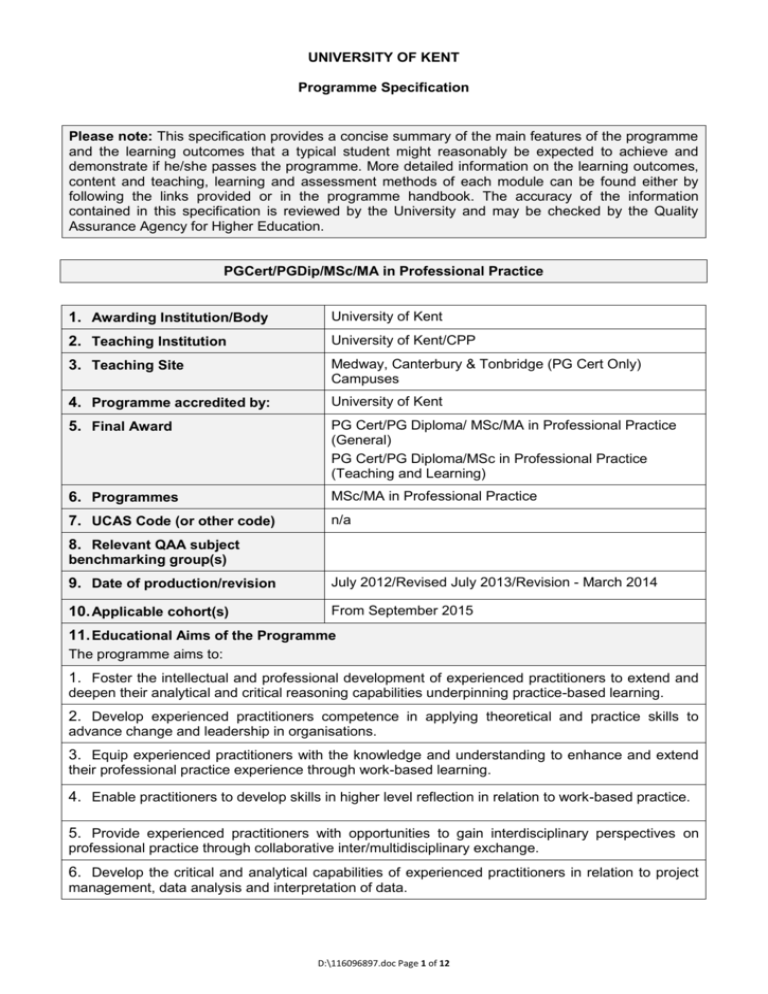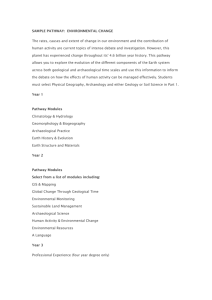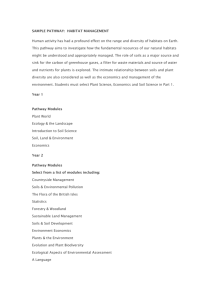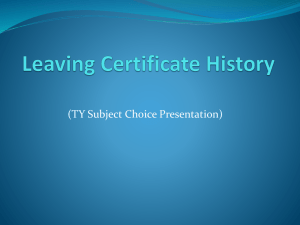MA/MSc in Professional Practice
advertisement

UNIVERSITY OF KENT Programme Specification Please note: This specification provides a concise summary of the main features of the programme and the learning outcomes that a typical student might reasonably be expected to achieve and demonstrate if he/she passes the programme. More detailed information on the learning outcomes, content and teaching, learning and assessment methods of each module can be found either by following the links provided or in the programme handbook. The accuracy of the information contained in this specification is reviewed by the University and may be checked by the Quality Assurance Agency for Higher Education. PGCert/PGDip/MSc/MA in Professional Practice 1. Awarding Institution/Body University of Kent 2. Teaching Institution University of Kent/CPP 3. Teaching Site Medway, Canterbury & Tonbridge (PG Cert Only) Campuses 4. Programme accredited by: University of Kent 5. Final Award PG Cert/PG Diploma/ MSc/MA in Professional Practice (General) PG Cert/PG Diploma/MSc in Professional Practice (Teaching and Learning) 6. Programmes MSc/MA in Professional Practice 7. UCAS Code (or other code) n/a 8. Relevant QAA subject benchmarking group(s) 9. Date of production/revision July 2012/Revised July 2013/Revision - March 2014 10. Applicable cohort(s) From September 2015 11. Educational Aims of the Programme The programme aims to: 1. Foster the intellectual and professional development of experienced practitioners to extend and deepen their analytical and critical reasoning capabilities underpinning practice-based learning. 2. Develop experienced practitioners competence in applying theoretical and practice skills to advance change and leadership in organisations. 3. Equip experienced practitioners with the knowledge and understanding to enhance and extend their professional practice experience through work-based learning. 4. Enable practitioners to develop skills in higher level reflection in relation to work-based practice. 5. Provide experienced practitioners with opportunities to gain interdisciplinary perspectives on professional practice through collaborative inter/multidisciplinary exchange. 6. Develop the critical and analytical capabilities of experienced practitioners in relation to project management, data analysis and interpretation of data. D:\116096897.doc Page 1 of 12 7. Provide supervision for advanced practitioner centred research that builds a culture of critical evaluation and enquiry in the practice environment. 8. Equip experienced practitioners for their role in challenging, questioning and realigning strategies for work-based practice. 9. Develop practitioners who will actively participate in shaping strategic organisational interests. 10. Develop opportunity for self-directed learning and reflection. 11. Enable experienced practitioners from a diverse range of educational backgrounds to access and participate in learning which seeks to capture reflection on experience gained in every day organisational practice. 12. Enhance the experienced practitioner’s programme of personal development. 12. Programme Outcomes The programme provides opportunities for students to develop and demonstrate knowledge and understanding, qualities, skills and other attributes in the following areas. The programme outcomes have references to the subject benchmarking statement for (SB). Knowledge and Understanding Teaching/learning and assessment methods and strategies used to enable outcomes to be achieved and demonstrated A. Knowledge and Understanding of: 1. Experiential learning - Theory, concepts and how they apply to practice. Teaching and Learning: Each module will be supported by: 2. Reflection on learning and leadership styles and approaches gained through practice. 3. Principles of strategic decisions making in organisations. 4. Principles and practice involved in collaborative working. 5. Reflective evaluation in relation to theoretical methodological frameworks. Lectures Seminars. Blended learning approaches Interactive problem-based scenarios Role play Leadership inventories Online activities through the University’s Virtual Learning Environment 6. Multi-agency working. Experiential learning in groups and 7. Practice-based research and enquiry. organisations. Assessment: 8. Principles of theory testing in practice in relation to enhancing and developing practice. 9. Demonstrate project management skills. 10. Develop professional knowledge in special area of practice. 11. Develop professional profile in relation to current practice that informs into personal career plans. Oral presentations Coursework assignments Seminar contribution Online discussion Reflective learning logs Written assignments Dissertation Skills and Other Attributes B. Intellectual Skills: 1. Present critical, analytical reasoning and Teaching and Learning: D:\116096897.doc Page 2 of 12 experiential learning in organised written and oral formats. 2. Critical analysis of case studies. 3. Engage in experiential learning that demonstrably enhances practice. 4. Ability to develop a reflective professional portfolio. Students are encouraged to engage through both line learning material and during seminar discussions. Assessment: Portfolio, presentations, written assignments and portfolios are designed to emphasise and test out concepts and methodologies learnt during individual modules. 5. Design and implement a programme of practice-based enquiry. 6. Collect and analyse qualitative or quantitative data from experiential learning to inform evidencebased enquiry. 7. Design, implement, analyse and present a substantial research project (Dissertation). C. Subject-specific Skills: 1. Engaging with members of multi-disciplinary teams. Teaching and Learning: Module specific skills are taught through: 2. Lead on strategic operational planning for organisations. Practical and analytical exercises Oral presentations 3. Demonstrate an in-depth understanding of change management. 4. Project management skills Seminars Written assignments. Workshops On-line Assessment 5. Present evidence-based practice. 6. Methodologies for evaluating analysing and appraising organisational practice. Coursework assignments Seminar contribution Online discussion Reflective learning logs Written assignments Dissertation. D. Transferable Skills: 1. Evaluation skills. 2. IT: Word, statistical modelling programmes. 3. Report writing. Teaching & Learning: IT and Library training Study skills will be delivered by Unit for Enhancement of Learning and Teaching. 4. Reflection on experiential learning. 5. Effective use of work-based practice experiential learning to establish a future personal plan within the context of professional development. 6. Independent learning skills required for continuing professional development. Assessment: Oral presentations Coursework assignments Seminar contribution Online discussion Reflective learning logs Written assignments D:\116096897.doc Page 3 of 12 Dissertation. 13. Programme Structures and Requirements, Levels, Modules, Credits and Awards The PGCert/PGDipMA/MSc in Professional Practice programmes is part-time over three academic years. There are two pathways each comprising three compulsory modules and a set of compulsory or optional modules specific to each pathway. The two pathways are as follows: PGCert/PGDip/MA/MSc in Professional Practice (General) PGCert/PGDip/MSc in Professional Practice (Teaching and Learning) Students will initially register for PGCert on both pathways (General and Teaching and Learning) with successful completion enabling them to register to continue with the programme at PGDip (at participating campus locations). Students who register to continue with the programme at PGDip will either register on the General pathway or, if eligible, on the Teaching and Learning pathway. Successful completion of PGDip enables the student to register to complete the full MA/MSc The programme is divided into three stages. Stage 1: In Stage 1 students undertake the core modules plus compulsory modules specific to each programme pathway totalling 60M level credits. Students who successfully complete Stage 1 of the programme and meet the credit framework requirements, but exit after Stage 1 or do not successfully complete Stage 2 will be eligible for the award of the PG Certificate. Stage 1: The Compulsory Modules common to all programmes pathways are as follows: Code Title Level Credits/ECTS Term WL814* WL813* Collaborative Working Evidence Based Practice 7 (M) 7 (M) 15 15 Spring/Summer Stage 1: The Compulsory Module for the ‘general’ and ‘teaching and learning’ programme pathway is as follows: PGCert Professional Practice (General Pathway and Teaching & Learning Pathway) Code Title Level Credits/ECTS Term WL815* Learning and Development 7 (M) 30 Autumn *NB. Cannot be compensated or condoned in all pathways. Stage 2: In Stage 2 students undertake the compulsory module plus compulsory or optional modules, depending on the programme pathway, totalling 60M level credits. In the case of the MA/MSc Professional Practice (General) students must complete the compulsory modules in Stage 1. All of the compulsory modules in Stage 1 offer grounding in the critical analysis of professional practice, life-long learning and research skills. NB: Stage 1 module learning and development prepares students for Stage 2 of the programme. The WL815 Learning and Development module is sustained by ongoing professional development, career planning, identifying, and writing up a learning contract which includes a Stage 2 ‘programme learning outcomes and module mapping exercise’. Having followed a structured programme in Stage 1, students then move into Stage 2 which offers a more flexible approach to academic learning in so much as each student D:\116096897.doc Page 4 of 12 can access their modules from across the University (Subject to agreement) or select optional modules from those available within CPP . This part of the programme is student directed, however modules are chosen with guidance and support from the Programme Director and is subject to agreement from the relevant school. Academic integrity of the programme will be monitored by the School Graduate Studies Committee. Stage 2 of the programme takes into account the students’ professional interests and contexts, by offering students the opportunity to choose their pathway modules from across the university. This is a generic award which will enable students to gain a broader learning experience linked to the students own professional interests. The emphasis is not so much on the teaching of professional practice but more about planning for and reflection on the application of practice. Specific choice of modules will show how the student intends to develop their individual learning objectives within the remit of programme learning outcomes (references to their chosen subject modules) in relation to their professional practice. Both the Programme Director and CPP Education, Guidance Offer will ensure that students are following an academically robust learning pathway. The procedure for module choices is that students will explore their module choices with the Programme Director and the CPP Student Support Officer (where appropriate), during the WL815 Learning and Development module sequence set out in the Autumn term. Following on from these students will then submit their module choices in the form of a Personal Learning and Development Plan. The Programme Director and CPP Student Support Officer will offer a workshop at the request of schools and partners who might wish to offer optional modules or pathways to professional practice students. The workshop will ensure that reflective practice is continually promoted by encouraging awareness and understanding of the nature of critical reflection on professional within a workplace environment. Once a firm written agreement is reached the Programme Director will convene a panel as a Subcommittee of the School Learning and Teaching Committee to approve the choices by way of presenting explicit written approval from the respective school. Representatives from the respective schools will also be invited to attend the Sub-committee meeting. The Director of the MSc/MA in Professional Practice will convene, and chair, the CPP Joint Learning and Teaching and Graduate Studies Sub Committee, see appendix 1 for process, roles and responsibilities of the Module Choice Sub Committee. Stage 2: The Compulsory Module common to each programme is as follows: Code Title Level Credits/ECTS Term WL817 Research Skills 7 (M) 15 Summer/ Autumn Stage 2: The CPP Optional Modules for the general programmes pathway are as follows: PGDip Professional Practice (General) Students choose their remaining modules adding to 45 M level credits from those negotiated from across the University Module Catalogue or by choosing the optional modules from within CPP CPP Stage 2 Optional Modules Code Title Level Credits/ECTS Term . WL825 Special Area of Study M 30 Autumn/Spring WL856 Power Dynamics Professional Practice within M 30 Autumn/Spring D:\116096897.doc Page 5 of 12 WL855 Qualitative Research Methods M Applied to Professional Practice 15 Spring WL857 Quantitative Research Methods M Applied to Professional Practice 15 Spring Optional Wild Modules from Across the University Catalogue 45 Credits To be completed within the Autumn and Spring Terms Stage 2: Students remaining modules adding to 45 M level credits are detailed below for the PGDip in Professional Practice (Teaching and Learning) programmes pathway: This is validated pathway specifically designed for the professional development of teachers and is delivered by Rochester Grammar School and Brompton Academy Partnership. Code Title Level Credits/ECTS Term WL867 A Thinking School: Transforming Learning M 30 Credits Autumn/Spring WL868 Addressing Barriers to Learning M 15 Credits Spring Students who successfully complete Stage 2 of the programme, meet the required credit framework, but exit after Stage 2 or do not successfully complete Stage 3 will be eligible for the award of the PG Diploma. Stage 3: In Stage 3 students under-take a compulsory module of 60M level credits. Students who successfully complete Stage 3 of the programme, meet the required credit framework, will be eligible for the award of a Master’s degree: MA or MSc in Professional Practice (General) MSc in Professional Practice (Teaching and Learning) Stage 3: Compulsory Module Code Title Level Credits/ECTS Term WL816 Dissertation 7 (M) 60 .Autumn Example of PGCert, PGDip, MA/MSc in Professional Practice Code Title Stage 1 Compulsory Modules WL814 Collaborative Working Compulsory WL813 Evidence Based Practice Compulsory Compulsory Module: WL815 Learning and Development Exit Point Level Credits Term(s) M 15 Spring/Summer M 15 Spring/Summer M 30 60 Autumn D:\116096897.doc Page 6 of 12 PG Certificate in Professional Practice (General) Stage 2 Compulsory Module WL817 Research Skills M 15 Autumn Plus Optional Modules or Wild Modules from across the University catalogue CPP Elective Modules: WL825 Special Area of Study M 30 Autumn/Spring Wild Modules CB933 Marketing M 15 Spring/Summer Exit Point M 60 PG Diploma in Professional Practice (General) Stage 3 Compulsory Module WL816 Dissertation M 60 .Autumn Exit Point 180 MSc in Professional Practice (General) Example of PGCert, PGDip, MSc in Professional Practice (Teaching and Learning) Code Title Level Credits Term(s) Stage 1 Compulsory Modules WL814 Compulsory Collaborative Working M 15 Spring WL813 Compulsory Evidence Based Practice M 15 Spring M 30 Autumn Compulsory Module: WL815 Learning and Development Exit Point PG Certificate in Professional Practice (General) 60 Stage 2 Compulsory Module WL817 Research Skills M 15 Summer/Autumn Plus Optional Modules or Wild Modules from across the University catalogue CPP Pathway Modules: WL867 A Thinking School: Transforming Learning M 30 Autumn/Spring WL868 Addressing Barriers To Learning M 15 Spring M 60 Exit Point PG Diploma in Professional Practice (Teaching and Learning) D:\116096897.doc Page 7 of 12 Stage 3 Compulsory Module WL816 Dissertation M Exit Point MSc in Professional Practice (Teaching and Learning) 60 .Autumn 180 14. Work-Based Learning CPP recognises the value and potential benefits of work-based learning as a mode of learning at a higher level. CPP also acknowledges that there are a wide range of views on what work-based learning means and that the terms are used interchangeably (e.g. workplace learning, work-related learning, vocational learning). Therefore, to be clear, as our students' learning is not primarily 'grounded' in the workplace, but related to it, through the application of classroom learnt theory to the student's own area of practice, CPP elect to use the term 'work-related' learning. The work-related learning element of this programme is underpinned by the Code Of Practice For The Assurance Of Academic Quality And Standards In Higher Education, September 2007 Section 9. Work-related learning is integral to the programme and emphasises widening learning opportunities, as well as integrating work related interest into postgraduate scholarship. Work-related learning provides the context for the critical appraisal and ongoing development of professional practice, thus practitioners from a broad range of professions are able to engage creatively with the concerns of their organisations in a conversant and research-minded way. There are two discrete elements, the first of which is learning in one’s own workplace (internal experience), the second is learning from the work experience of others (external). Students will be required to work in learning sets which will enable collaboration on the work-related element of the programme. In order to support the work-related learning aspect, students will be encouraged to identify a workbased mentor. Students, who, for whatever reason, cannot identify a work-based mentor, will be granted access to support from the Centre for Professional Practice (CPP) Student Support Officer. The CPP Student Support Officer will both support student and act as organisational/employer liaison. The programme team will provide training for organisations wishing to offer workplace mentorship. This will consist of a one-day workshop. The workshop will be offered twice in the first year of the life of the programme and once annually thereafter. The CPP Student Support Officer will also act as an advocate, providing continual feedback from organisations/employer/employee to the programme team. This work-related learning strategy is designed to ensure that students are not disadvantaged by their status of employment or access to work-related support, in so much as the emphases on workbased learning is about developing research mindedness and enquiry-based learning activities leading towards an extensive research project or dissertation. As practitioner research is a central theme of the programme, it forms an integral part of the practice based enquiry. Hence students will seek out learning opportunities and test out theories which might emerge from their own enquiry based practice. In order to facilitate this, each student will be allocated an individual University personal tutor. The relationship between tutor and student is intended to foster critical reflection, advanced level debate and explore ‘real-life’ work-based problems and interests. Students must demonstrate that the learning acquired from across the programme can be used for professional and personal development within the context of their work place/occupation/profession. Throughout the programme students will have access to work-related learning resources such as: Individual tutorials, action learning sets, seminars and group activities, formal lectures and presentations. Student Support Officer (CPP) E-learning resources which support and enable learners from outside the University to D:\116096897.doc Page 8 of 12 access learning resources off-campus. Students will build an advanced practice portfolio that incorporates a skills review, evidence of activity outcomes, and a reflective account of work based learning including a work-related portfolio. Portfolio records will include choice of modules or subject pathway associated with an area of personal, professional development. Access to allocated time slot for regular tutorial sessions. Disability Statement: Where disabled students are due to undertake a work placement as part of this programme of study, a representative of the University will meet with the work placement provider in advance to ensure the provision of anticipatory and reasonable adjustments in line with legal requirements. 15. Support for Students and their Learning. Prior to commencing the programme students will have access to: Induction session for general teaching arrangements, library and IT use. Programme Handbook. Programme Director and identify any support needs. Support services from the University including; Learning Resources Centre, Medical Centre, Students’ Union, Careers Advisory Service, Student Support and Wellbeing and UELT. 16. Entry Profile. For fuller information, please refer to the University prospectus For general admission to the programme you should normally have obtained a First Class or Upper Second Class degree or a relevant professional qualification. Minimum of two years’ practitioner experience. Entry Process Each applicant will complete a University application form. Applicants will be invited for a formal discussion to ensure that they understand the nature of the programme. The minimum age to study a degree programme at the university is normally at least 17 years old by 20 September in the year the programme begins. There is no upper age limit. For Admission on to the Teaching and Learning Pathway only: Qualified Teaching Status What does this programme have to offer? The opportunity to develop high level reflection on experience gained through practice. Experiential learning. Flexible, modular format with blended learning approaches. The opportunity to develop knowledge and understanding of the complexities of inter-disciplinary working. Choice of subject pathways relevant to individual and or organisational learning and development needs. Access through the University’s Virtual Learning Environment. D:\116096897.doc Page 9 of 12 A high standard of teaching delivered by experienced academic staff. A programme that is recognised by national and local employers. Personal Profile. Students entering the programme will be expected to demonstrate the following: Professional experience in a role that involves responsibility for autonomous practice for at least two years. An ability to study at postgraduate level normally evidenced through previous accredited and experiential learning. 17. Methods for Evaluating and Enhancing the Quality and Standards of Teaching and Learning. Mechanisms for review and evaluation of teaching, learning, assessment, the curriculum and outcome standards. Student evaluation and feedback through module evaluation questionnaire. Code of practice Periodic Programme Review. Staff-Student Liaison Committee. Student Representatives on the Board of Studies (3 x per year). External Examiner - conducts regular scrutiny and provides an annual report. Annual staff appraisal. Peer review and observation of the teaching. Continuous monitoring of student progress and attendance. QAA Periodic Review for all Collaborative (bespoke) Partnerships with External Organisations. Committees with responsibility for monitoring and evaluating quality and standards. An annual report will be provided including detailed programme performance data. This will be considered by the Board of Studies and oversight secured through: CPP Research Ethics Committee CPP Division of Professional Practice meetings CPP Learning and Teaching Committee. Student Staff Liaison Committee Faculty Graduate Studies Committee. Mechanisms for gaining student feedback on the quality of teaching and their learning experience Student module evaluation reports Annual programme evaluation report Staff-Student Liaison Committee Student representatives Student Union feedback Academic tutor and course tutor as points of contact for feedback Staff Development priorities include: Experiential learning seminars Managing and leading Action Learning Sets D:\116096897.doc Page 10 of 12 Professional mentoring Understand the support needs of part-time postgraduate students Conferences. Links with other HEIs providing effective work-based learning (e.g. University of Derby, University of Leicester, University of Middlesex) 18. Indicators of Quality and Standards. Enhanced partnerships with employers, other HEIs. Code of Practice Retention of students above the benchmark (90% of students progress or complete each year). Attendance and participation is above 90%. Feedback from employers. External recognition of University computing and library services. Feedback from professions on career progression is positive. Student completion rates and level match HEFCE benchmark. Annual Monitoring reports from External Examiners are positive. QAA Audit The following reference points were used in creating these specifications: The University of Kent Mission Statement Code of practice The University of Kent Credit Framework The University of Kent QA Policy and Procedures The University of Kent Teaching and Learning Strategy CPP Strategic Business Plan D:\116096897.doc Page 11 of 12 Module Mapping of Core and Compulsory Modules by Pathway PGCert, PGDip, MA/MSc in Professional Practice General Pathway CPP Modules Only All pathways WL813 Evidence Based Practice A1 A2 A3 A4 A5 A6 A7 A8 A9 A10 A11 B1 B2 B3 B4 B5 B6 B7 C1 C2 C3 C4 C5 C6 D1 D2 D3 D4 D5 D6 X X X X X X X X X X X X X X X X X X PG Certificate WL814 WL815 Collaborative Learning and Working Development X X X X X X X X X X X X X X X X X X X X X X X X X X X X X X X X X X X X WL817 Research Skills X X X X X X X X X X X X X X X X X X X X X WL825 Special Area of Study X X X X X X X X X X X X X X X X X X X X X X X X X X X X X . WL856 Power Dynamics Within PP PG Diploma WL857 Quantitative Teaching and Learning Pathway MA/MSc WL855 Qualitative X X X X X X X X X X X X WL867 A Thinking School: Transforming Learning WL868 Addressing Barriers To Learning X X X X X X WL816 Dissertation X X X X X X X X X X X X X X X X X X X X X X X X X X X X X X X X X X X X X X X D:\116096897.doc Page 12 of 12 All Pathways X X X X X X X X X X X X X X X X X X X X X X X X X X X X X








